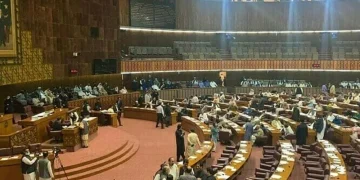In a move that signals a major shift in the augmented reality (AR) gaming industry, Niantic Labs is selling its entire video game division to Saudi Arabia-owned Scopely for $3.5 billion.
The deal includes some of Niantic’s most well-known titles Pokémon Go, Monster Hunter Now, and Pikmin Bloom along with their supporting platforms like Campfire and Wayfarer. However, Peridot and Ingress will remain under Niantic Spatial, the company’s AR-focused division.
This sale marks Niantic’s struggle to maintain its dominance in AR gaming beyond its early success with Pokémon Go. But for Saudi Arabia, it’s yet another step in aggressively expanding its gaming empire through the Public Investment Fund (PIF).
So, what does this deal really mean? Is it a lifeline for Niantic, a power move by Saudi Arabia, or a shift in the future of AR gaming? Let’s break it down.
Why Did Niantic Sell Its Gaming Division?
At first glance, selling a division that includes a billion-dollar revenue business may seem like an odd move. But for Niantic, the decision reflects years of declining momentum and missed opportunities.
1. Pokémon Go’s Success Was Never Repeated
When Pokémon Go launched in 2016, it was an instant cultural phenomenon bringing in over 500 million players in its first year. However, its growth stalled in 2020 as the COVID-19 pandemic forced players indoors, undermining the game’s core mechanics of real world exploration.
Since then, Niantic has struggled to replicate that success with other AR games:
✔ Monster Hunter Now and Pikmin Bloom have niche audiences but lack Pokémon Go’s global pull.
✔ Multiple projects were canceled, including a highly anticipated Harry Potter AR game.
✔ Niantic laid off 310 employees between 2022 and 2023 to cut costs and refocus.
Selling the gaming division removes financial strain, allowing Niantic to focus on its AR technology and mapping innovations.
2. Saudi Arabia’s Gaming Ambitions Are Expanding
This acquisition isn’t just about Pokémon Go. It’s part of Saudi Arabia’s aggressive push into gaming, with billions invested through the Public Investment Fund (PIF).
Saudi Arabia has previously acquired stakes in:
- Nintendo
- Activision Blizzard (before Microsoft’s takeover)
- Electronic Arts (EA)
And in 2023, PIF’s Savvy Games Group bought Scopely for $4.9 billion, making it one of the region’s biggest gaming acquisitions.
By adding Niantic’s gaming division, Saudi Arabia is securing one of the world’s most valuable AR franchises cementing its position as a global gaming powerhouse.
What Happens to Pokémon Go and Other Games?
The good news for players? Pokémon Go isn’t disappearing—but there could be major changes ahead.
Scopely will now own and manage Pokémon Go, Monster Hunter Now, and Pikmin Bloom.
Campfire and Wayfarer, key tools for AR community building, will also transfer to Scopely.
Niantic will keep Peridot and Ingress, focusing on AR infrastructure rather than game development.
Scopely’s Chief Revenue Officer Tim O’Brien hinted last year that a “megadeal” was coming, involving a global franchise generating at least $1 billion annually. With Niantic’s games reportedly bringing in $1 billion in revenue last year, this acquisition aligns perfectly.
What This Means for the Future of AR Gaming
1. More Investment in Pokémon Go, But With New Monetization?
Scopely specializes in mobile gaming monetization—known for games like Monopoly Go!. With Pokémon Go now under its control, we may see:
✔ More in-game purchases and events to drive revenue.
✔ Stronger marketing strategies to re-engage players.
✔ Potential expansions into new AR experiences or crossovers.
But there’s also a risk—will aggressive monetization changes alienate Pokémon Go’s dedicated player base?
2. Saudi Arabia’s Long-Term Gaming Strategy Is Now Impossible to Ignore
Saudi Arabia’s gaming investments are no longer just financial stakes in Western companies—they now own entire gaming ecosystems.
- Savvy Games Group has pledged to invest $38 billion to make Saudi Arabia a global gaming hub.
- With Scopely now controlling Niantic’s games, Saudi Arabia directly influences a major AR gaming platform.
- This could lead to future exclusivity deals, regional gaming expansions, and further consolidation in the industry.
3. What’s Next for Niantic?
By offloading its gaming business, Niantic is shifting toward AR technology and mapping services.
✔ It will double down on AR platform development for third-party apps.
✔ Its Wayfarer mapping tech could expand into smart cities and real world navigation.
✔ Ingress and Peridot remain under Niantic Spatial, which suggests a pivot toward AR beyond gaming.
Final Thoughts: A Game-Changing Deal in Every Sense
Niantic’s sale to Scopely is more than just a business move—it’s a defining moment for AR gaming, Saudi Arabia’s gaming ambitions, and the future of Pokémon Go.
- For Niantic, it’s an exit from game publishing and a pivot toward AR technology.
- For Scopely and Saudi Arabia, it’s a power move that solidifies their dominance in mobile gaming.
- For players, it’s an uncertain future—will Scopely enhance Pokémon Go, or will its monetization strategy change the experience?
As the AR gaming space evolves, this acquisition will likely shape how mobile games merge with real world experiences for years to come.













